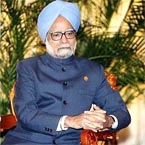Manmohan heads for `foreign’ G-20, while Sonia takes charge of domestic G-20
 New Delhi, Mar. 31: Comparisons at the best of times are odious, but can make for interesting reading, especially when it involves an election on the one hand, and the importance being attached to attending an international summit in the "national interest".
New Delhi, Mar. 31: Comparisons at the best of times are odious, but can make for interesting reading, especially when it involves an election on the one hand, and the importance being attached to attending an international summit in the "national interest".
The Prime Minister, Dr. Manmohan Singh, is leaving for London this afternoon to attend the second Group of Twenty (G-20) Summit, which will primarily address the global recession and what has caused it, while back at home, UPA Chairperson Sonia Gandhi has been left to deal with a G-20 of her own - that is "Gowda's 20", or the so-called "Third Front" cobbled up by former Prime Minister and Karnataka strongman H. D. Devegowda.
This "assigning of duties" speaks volumes for the healthy partnership that exists between Dr. Singh and Sonia Gandhi, a rare partnership that has consistently focused on striking a workable balance between national and domestic political compulsions.
The confidence with which Dr. Singh is leaving the shores of India again to attend an international summit of global leaders and leaving the management of internal coalitions and domestic politics in the able hands of Sonia Gandhi is an example not visible in other parts of the world.
Take for instance, the United States. When the impact of the global recession was at its worst towards the latter half of 2008, Washington was in the midst of an administrative transition. No one seemed to care in the corridors of power about the looming national economic catastrophe. The US presidential elections had just been held, and Barack Obama, was declared elected as the 44th and first Afro-American President-elect. Outgoing President George W Bush was busy wrapping up his final official engagements and packing for his retirement in Dallas, Texas.
Neither of them, nor their aides, seemed interested in putting their politics aside to join up to address the crisis head-on. The message going out from both Washington and Chicago (headquarters of Bush and Obama respectively) was "It's not my problem, It's yours". There was not only a "power vacuum", but also an "administrative vacuum" in the United States for more than three months, and who suffered from this literal limbo or deep freeze imposed by business sharks? The hard working middle class and less privileged class in America.
In contrast, there is India, where, no such power or administrative vacuum ever had a chance to exist in the last five years of UPA rule (2004-09). The Prime Minister has gone about his business of promoting India as an emerging world power and economic giant, demanding that it gets its rightful place in the international order, consistently demanding a restructuring of the world order to include lesser developed but progressive countries like India, Brazil, Japan and South Africa in the international decision-making process, and at the same time, ensuring that he and Sonia Gandhi as the leaders of the ruling UPA coalition address domestic issues and compulsions in a well-heeled, well-oiled and time-tested manner.
The fact that general elections are to take off in the second week of April would prevent most others from venturing abroad, and allowing a senior minister and a senior team of officials to attend something as "insignificant" (from a domestic point of view) as the G-20. Not so with Dr. Singh. For him, it has always been about what needs to be done in the national interest, what needs to be done to secure the country nationally. This is not to say that wooing votes for the UPA is not on his mind. It is there, but he and Sonia Gandhi have reached an understanding and a commonality of purpose about who will look after what in the absence of either of the two.
Countries and governments can learn and apply from this unique partnership. (ANI)